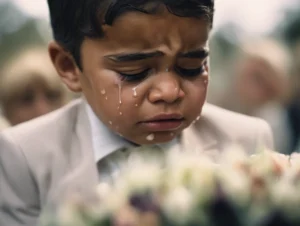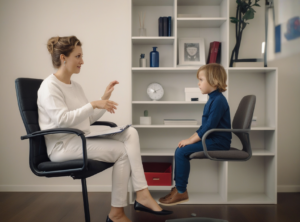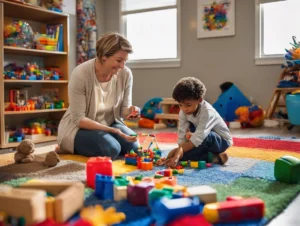Supporting Your Child’s Journey to Mental Wellness
Empowering children through compassionate therapy and tailored support for emotional growth.
What we find

Trauma
Child trauma can arise from a varius of stressful experiences from playground bullying to abuse.

Depression & Anxiety
Child anxiety and depression may stem from starting a new school year to general feelings of worthlessness.

Grief & Loss
Child grief and loss may stem from moving to a new city, divorce or the loss of loved one.

Behavioral Issues
Child behaviors issues are generally an indicator of other underying concerns and often need further exploration

Parallel Parenting
Parallel parenting can be an effective approach for high-conflict situations, allowing parents to focus on their child.

Sand tray allows the individual to express their emotions in a nonverbal manner. The tray is filled with sand and various miniatures representing people, animals, objects, and symbols.

Child and Adolescent EMDR is beneficial in treating trauma, anxiety, depression, and other psychological issues, especially those related to past trauma or adverse experiences.

Play therapy incorporates techniques to express complex emotions they may not understand; board games, card games, or structured games can be used to build social skills, problem-solving abilities, and coping strategies

Effective for children and adolescents ages 3 and 18 recovering from traumatic experiences of physical or sexual abuse, natural disasters, domestic violence, bullying, and accidents.

For children and adolescents, narrative therapy is a powerful tool to help them make sense of their experiences, reframe negative beliefs, and gain control over their lives.

For children and adolescents, IFS aids in the understanding that individuals consist of various parts akin to a family structure. IFS fosters self-awareness, enhances emotional regulation, and improves interpersonal relationships for young individuals.
Meet Our Skilled Professionals
Get to know our dedicated experts and discover how their diverse backgrounds and experiences can empower your journey towards healing and growth.

Therapist Profile
Explore the profiles of our therapists who are committed to fostering trust and security in your mental health journey.

American Association of Christian Counsleors
Meet our counselors, each uniquely qualified to guide you with compassion and expertise through your personal challenges.
About Teresa
Teresa serves as a Licensed Associate Counselor (LAC) at Durham Psychology Group. She holds a Master of Arts in Clinical Mental Health and is pursuing a Master of Science in Forensic Psychology. She is a proud member of the International Honor Society, proving her high standards in the profession. With a Bachelor of Science in Psychology from Troy University, she has dual minors in substance abuse and addiction, as well as Social Science. Outside of her professional life, Teresa loves to spend quality moments with her family and engage in church events that provide her solace. Celebrating 30 years of marriage, she and her husband cherish their three adult children and two daughters-in-law, who enrich their lives.
As a military spouse for over a decade, her eldest son is a veteran, and her younger son continues to serve actively. Previously, she was a business owner for more than 10 years.
Having faced her own family’s trauma, Teresa is dedicated to assisting others through similar trials. She targets her efforts on guiding younger people, from early childhood through young adulthood. Acknowledging everyone’s individuality has allowed her to adopt various therapeutic techniques, such as EMDR, Trauma-Informed Cognitive Behavioral Therapy, Cognitive Processing Therapy, Narrative Therapy, Play Therapy, Sand Tray Therapy, and more. After completing EMDR training, she is on her path to certification in this technique.
Under the guidance of Donald Durham, Ph.D., who is an accredited Clinical Supervisor recognized by the Arizona Board of Behavioral Health Examiners, Teresa will operate from the Gilbert office, offering both in-person and virtual counseling sessions.

Testimonials
Frequently Asked Questions
Do I need to take my child out of school for therapy?
Missing school for therapy is typically seen as an excused absence, just like a visit to the doctor. If your child or teen needs to attend therapy sessions, it might be helpful to schedule these appointments either at the start or toward the end of the school day.
What happens in therapy?
Unlike adult therapy, which relies on talking through problems, child therapy is tailored to the child’s or adolescent’s developmental level. This usually involves a mix of talking, creative activities, and play.
How long do kids usually stay in therapy?
- Short-term (6-12 sessions): For situational or mild issues (e.g., stress, adjustment).
- Moderate-term (6 months to a year): For more persistent emotional or behavioral concerns.
- Long-term (1-2 years or more): For chronic mental health issues, trauma, or complex family dynamics.
What are the confidentiality rules for a a child in therapy?
Parents or legal guardians of children and adolescents under 18 usually provide consent for therapy and are typically entitled to receive information about the therapy process. However, this does not mean the child’s words will automatically be shared with the parents. Even though therapists respect adolescent confidentiality, there are limits. If an adolescent shares something that suggests a risk of harm to themselves or others (such as suicidal ideation, self-harm, or plans to harm someone else), the therapist is required to take action to protect the adolescent or others.
Do I take health insurance?
Unfortunately, we are not able to bill your health insurance directly. Instead, we offer clients a superbill, which allows them to handle reimbursement with their insurance companies directly.
Contact Us

